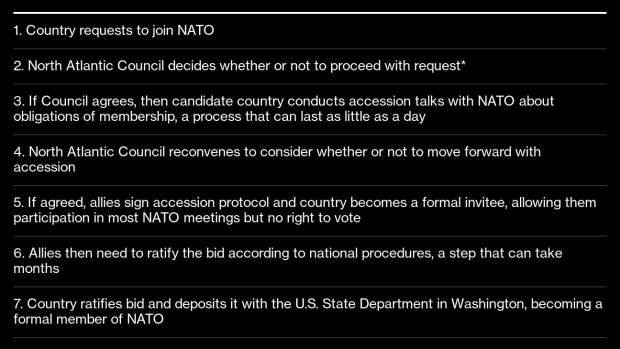Jun 28, 2022
Turkey Satisfied With Pledges From Finland and Sweden on NATO
, Bloomberg News

(Bloomberg) -- Turkey is satisfied with pledges from Finland and Sweden on its security concerns, paving the way for NATO membership talks that have been stalled for weeks, according to an official.
The move follows a meeting in Madrid on Tuesday between President Recep Tayyip Erdogan, NATO Secretary General Jens Stoltenberg, Finnish President Sauli Niinisto and Swedish Prime Minister Magdalena Andersson ahead of an alliance summit. Stoltenberg is due to hold a press confernce on Tuesday evening on details of an agreement.
Erdogan’s government, which has the power to veto accession bids, understands that both Sweden and Finland have vowed to crack down on Kurdish groups that Turkey views as terrorists, said the official who declined to be named on a confidential issue.
Membership of the North Atlantic Treaty Organization for the two previously neutral countries would mark a significant shift in the European security landscape after Russia’s invasion of Ukraine.
The next step would see NATO allies meet, possibly even in Madrid, to formally accept the applications and allow the countries to start accession talks. The process will still take many months, including ratification from NATO allies’ parliaments, before Finland and Sweden become members and can benefit from the alliance’s article 5 collective defense commitments. All 30 alliance members need to sign off.
Read More: NATO Expansion Could Finally Shore Up Alliance’s Weakest Flank
Turkey and Sweden will hold political consultations in Ankara on Wednesday, the Turkish foreign ministry said in a statement. Officials will discuss bilateral relations and ties between Turkey and the European Union among other issues, the ministry said.
Stoltenberg, who also held separate talks with Erdogan on Tuesday in a break from the broader meeting with Finland and Sweden, has held a series of discussions with the Turkish leader over recent days.
The US has stressed that bringing the two Nordic countries into the fold could make the alliance more secure. Turkey’s block complicated the allies’ efforts to present a united front in light of Russia’s invasion of Ukraine.
National Security Adviser Jake Sullivan said earlier Tuesday the US believes “that Finland and Sweden have taken significant steps forward in terms of addressing Turkey’s concerns.”
Sullivan said he expected President Joe Biden and Erdogan to talk Tuesday “to focus mainly on the strategic issues between the US and Turkey and regional issues that are relevant to the two countries.” He added that “of course, the issue of Finland and Sweden will come up but we don’t anticipate that that’s going to be the central focus of the president’s meeting with President Erdogan.”
Sweden has tightened laws on terrorism in recent years, and more steps in that direction are under way. Niinisto has said Finland’s anti-terror legislation is on par with current NATO members following a revamp last year.
The Nordic nations have also highlighted constitutional protections for freedom of speech, meaning they could not prevent peaceful Kurdish demonstrations, and said any extraditions requested by Turkey must be ruled on by courts. When it comes to lifting bans on arms exports, Andersson in June signaled that the Swedish authorities that grant arms-export approvals may take a different view on shipments to Turkey in light of the NATO membership bid.
Throughout the negotiations, Finland and Sweden insisted they meet all NATO’s entry criteria.
Finland, which has 1,300 kilometers (800 miles) of border with Russia and a history of wars against its eastern neighbor, was driven into the fold of the North Atlantic Treaty Organization by Russia’s Feb. 24 invasion of Ukraine, and pulled neighboring Sweden along.
The attack shifted popular opinion overnight, with policy makers rapidly kicking off the process to join.
Both nations’ militaries are compatible with NATO and include a large number of artillery and tanks. Finland has held onto a conscription-based system, meaning about 900,000 citizens in a country of 5.5 million have had military training, and it’s able to deploy 280,000 of them in war time. Sweden brought back military conscription from 2018.
Finland in December decided to buy 64 Lockheed Martin Corp. F-35A multi-role fighter jets to replace its aging F/A-18 Hornets in a 10 billion-euro ($10.5 billion) procurement, and Sweden’s Saab AB makes a plethora of defense systems, including JAS Gripen warplanes and submarines.
(Updates with context, details from fourth paragraph)
©2022 Bloomberg L.P.






